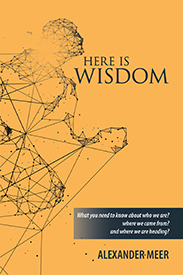
 |
Here Is Wisdom: What You Need to Know About Who We Are? Where We Came From? and Where We Are Heading?
by Alexander Meer
Xlibris
When it comes to the largest, existential questions about life and its purpose, people tend to fall into two camps. Either they believe in a higher spiritual plan that guides them, or they point to science that postulates that humanity is merely here as part of a natural cycle. While the answer continues to elude all but the most assured minds, this book highlights the fluidity of what we as a society or a species tend to define as the most likely answers. Each chapter of this book highlights a different time period from the creation of life to the digital age and examines what humans tend to accept as the reasons for being. Reflecting changing attitudes on things like rights, protections, and freedoms, this text weaves philosophy, anthropology, science, faith, and history together into a braid that seeks to shed light on the things that keep us wondering.
Whether one subscribes to ancient philosophers' ideas or the teachings of a preferred faith, this book respectfully answers the question of where these ideas come from and how they relate to people throughout their eras of existence and prominence. The author suggests reading each of the forty chapters of this book one day at a time, and considering the wealth of information here, that plan gives the reader time to evaluate and not have their head swimming with data. What proves to be fascinating is how the more prominent ideas shape, grow, and evolve over centuries and in different lands. Being objective, the author treats these concepts fairly and weighs them based on the lifestyle framework of the time. This leads to a read that is thought-provoking and balanced for any reader who has a mind open enough to question what they think or believe.